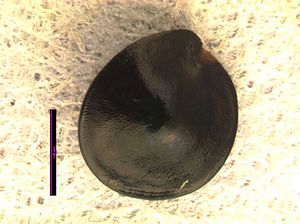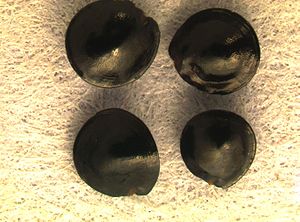Difference between revisions of "Montia linearis"
| Line 1: | Line 1: | ||
| − | |||
| − | |||
| − | |||
| − | |||
===Seed=== | ===Seed=== | ||
'''Montia linearis:''' MOLI | '''Montia linearis:''' MOLI | ||
| Line 13: | Line 9: | ||
Seeds are papillose with some small ridges around the surface edges. | Seeds are papillose with some small ridges around the surface edges. | ||
| + | |||
| + | |||
| + | Could be confused with: Caladrinia ciliata | ||
'''Latitudinal Cross Section:''' : rhombic [[File:MOLI- lat.png]] | '''Latitudinal Cross Section:''' : rhombic [[File:MOLI- lat.png]] | ||
Revision as of 13:29, 14 February 2012
Seed
Montia linearis: MOLI
Seed sample from: 2011
Measurement: 2.2 x 2.2 x 1
Features: Seed lenticular in shape. Hilium scar is white, surrounded by a ring of brown. Seed is dark red to black. Could be confused with: Caladrinia ciliata
Seeds are papillose with some small ridges around the surface edges.
Could be confused with: Caladrinia ciliata
Latitudinal Cross Section: : rhombic ![]()
Longitudinal Cross Section: elliptical ![]()
Basic Explanations and Assumptions:
The dimensions for the seeds are length x width x depth. The location of the hilum is used as the base of the seed, and the length is measured from hilum to the opposite apex. Where a style is present, the length is measured from the hilum to the bottom of the style. Width is measured at a right angle to the length at the widest part. Depth is measured at a right angle to the intersection of height and width lines.
Measurements included are the mean average for each measurement of ten separate seeds.
All measurements in millimeters unless otherwise noted.


